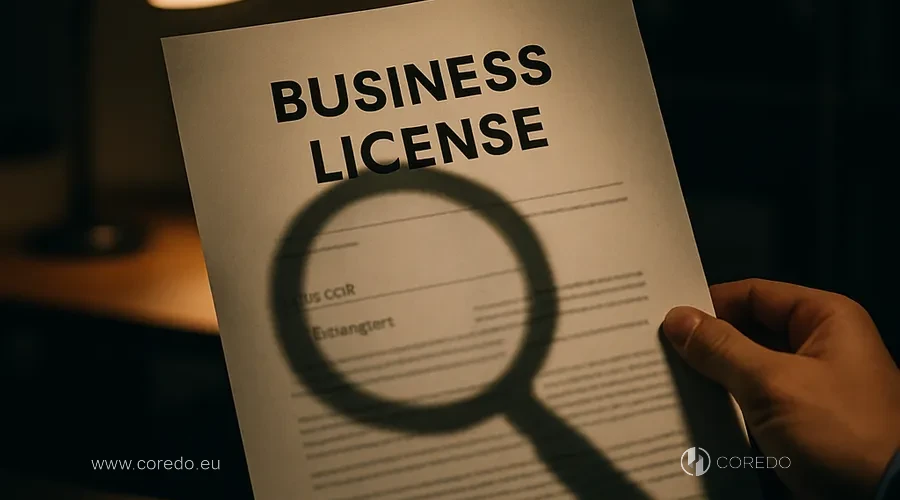In 2025 the financial services market in South Africa is showing growth rates that surprise even experienced analysts: according to the FSCA, the volume of electronic payments in the country increased by 18% over the past year, and the number of applications for financial service provider licenses in South Africa reached a historic high.
Amid tightening regulation and growing requirements from the South African Reserve Bank (SARB), even experienced entrepreneurs face opacity in procedures, difficulties in preparing documentation and the need for a deep understanding of legislation, including the Financial Sector Regulation (FSR).
If you want to gain a strategic advantage and avoid pitfalls, I recommend reading to the end — you will find answers to the most pressing questions and learn how the COREDO team helps clients not only to obtain a license but also to build an effective business model in South Africa.
Licensing of payment systems in South Africa

The South African Reserve Bank (SARB), the key regulator that sets the rules of the game for everyone planning to provide financial services in South Africa. SARB is responsible not only for issuing the national currency but also for supervising payment systems, ensuring the stability and transparency of the financial sector in South Africa.
It is the FSR that determines which types of licenses are available, from the Payment Institution License (PI license in South Africa) to specialized permits for cryptocurrency and fintech companies.
In COREDO’s practice there are cases when companies that did not pay sufficient attention to the details of the FSR faced license refusals due to non-compliance with structural or procedural requirements. Therefore, a deep understanding of the regulatory environment is the foundation for a successful launch of payment systems and other financial services in South Africa.
Understanding all aspects of the FSR plays a decisive role in preparing to meet the requirements imposed on financial service providers in South Africa.
Requirements for financial service providers in South Africa

Requirements for financial service providers in South Africa reflect high standards of transparency, control and business resilience. The FSCA regulator imposes strict conditions on capital, internal procedures and the qualifications of key persons to ensure client protection and industry stability. Below we will consider the key aspects that a provider must meet when entering the South African market.
Financial stability and types of capital
SARB imposes strict requirements on the financial stability of applicants. The minimum amount of authorized capital for a PI license in South Africa depends on the volume and nature of the services offered, but COREDO’s practice shows: for most companies the optimal capital level starts from 5 million ZAR (equivalent in foreign currency is allowed). It is important not only to show the availability of funds but also to justify their origin: this is a key element in the fight against money laundering.
Qualifications and experience of managers
SARB and the FSCA (Financial Sector Conduct Authority) require that management and key employees have not only relevant education but also proven experience in the financial sector. It is important to demonstrate competencies in risk management, AML/KYC procedures and corporate governance.
Internal company policies and procedures
Without a soundly developed business plan and internal policies, obtaining a PI license in South Africa is practically impossible. The regulator requires a detailed description of the business model, financial forecasts, risk management strategies, as well as the implementation of comprehensive AML/KYC procedures.
Implementing an internal control system and regular audits is not a formality but a mandatory condition. The solutions developed at COREDO allow clients not only to meet SARB requirements but also to build an effective transaction monitoring system, which is especially relevant for companies working with digital financial services.
How do I obtain a financial services provider license in South Africa?

obtaining a license for a financial service provider in South Africa: this is structuredThis process requires careful preparation of documents in strict compliance with the requirements of local legislation and the FSCA regulator. It is important not only to correctly assemble the main package, but also to take into account specific criteria regarding corporate structure, the qualifications of key persons and internal regulations – it is from these stages that the path to successful licensing begins.
Preparation of the document package
Key stage: compiling the full set of documents. The list includes:
- Founding documents (articles of association, certificate of incorporation)
- A detailed business plan with financial models
- Policies on AML/KYC, risk management, and internal controls
- Proof of management’s qualifications
- Audited financial statements and information on the source of funds
In one of COREDO’s cases, a client from the EU had to adapt internal policies to the specifics of South African legislation to avoid additional requests from the SARB.
Timelines and stages of application review
After submitting documents to the SARB, a multi-stage review procedure begins. The regulator may request clarifications, additional information and conduct interviews with management. In practice, the process takes from 4 to 8 months, in some cases longer if questions arise about ownership structure or sources of funding.
License costs: obtaining and maintaining
Total expenses include government fees (from 200 000 ZAR), auditors’ and consultants’ services, as well as regular payments for maintaining the license and carrying out mandatory checks. It is important to account for expenses for annual updates of internal policies and staff training – COREDO’s practice confirms that savings in these items can lead to fines or even suspension of the license.
How does licensing in South Africa depend on the FATF and its standards?

South Africa: a FATF member, which means all financial service providers are required to integrate international AML/KYC standards into their business processes. FATF requirements directly affect the structure of compliance procedures, the internal control system and disclosure obligations.
South African regulators actively implement FATF recommendations into national legislation, which is reflected in requirements for transparency of ownership structure, source of funds and regular reporting.
Risks when obtaining and maintaining a license

Particular attention is paid to financial stability, transparency of corporate structure and the effectiveness of AML/KYC procedures.
To minimize risks, we recommend implementing automated monitoring systems and conducting regular independent audits.
In a context of rapidly changing regulatory requirements, effective risk management becomes a critical factor for the long-term resilience of the business.
Let’s move on to an overview of modern payment system technologies in South Africa.
Modern payment system technologies in South Africa
Digital financial services and the adoption of new technologies are driving the development of the payment systems market in South Africa. The use of blockchain, artificial intelligence and cloud platforms enables licensed companies not only to optimize processes but also to meet growing regulatory requirements.
Such technologies are becoming the new standard for financial service providers in South Africa.
Technological trends also affect licensing requirements: the SARB expects applicants not only to comply with basic standards but also to be ready to rapidly implement innovations into operational activities.
How to obtain a license: step-by-step guide
COREDO’s experience shows that successfully obtaining a financial service provider license in South Africa requires a clear step-by-step plan:
- Conduct a readiness audit of the company for licensing: assess structure, finances, and team qualifications.
- Prepare a complete document package taking into account SARB and FSR requirements.
- Develop and implement internal AML/KYC, risk management and internal control policies.
- Ensure transparency of ownership structure and sources of funding.
- Engage proactively with the regulator, providing clarifications and supplementing documents upon request.
To optimize the process, the COREDO team recommends using digital tools for preparing and storing documents, as well as engaging independent experts in advance to assess the business plan and compliance procedures. This approach reduces costs and minimizes the likelihood of refusal.
Consequences of a license refusal
Initiatives for business and development
Refusal of a financial service provider license in South Africa can be caused by insufficient document preparation, an opaque ownership structure, or non-compliance with AML/KYC standards. It is important to understand that a refusal is not a sentence: the COREDO team has assisted clients at the appeal stage, helping to address comments and resubmit the application.
Nevertheless, with a competent approach and timely adjustment of business processes, it is possible to restore market positions.
Obtaining a PI license opens up new prospects: expanding the product range, entering international markets, attracting investment. The prospects for the development of financial services in South Africa directly depend on companies’ readiness to integrate new technologies and comply with international standards.
Key conclusions and recommendations
A financial service provider license in South Africa is not only a formal permit but also a strategic asset that ensures legality, client trust, and access to a fast-growing market. Successful licensing requires a deep understanding of the regulatory environment, strict compliance with SARB and FSR requirements, and a willingness to integrate FATF international standards.
For entrepreneurs and executives interested in international expansion, this market opens up unique opportunities, provided there is professional support and strategic planning.
If you are ready for new challenges and want to gain a competitive advantage in the South African financial services market, the COREDO team is always ready to share its experience and help at every stage of the journey.